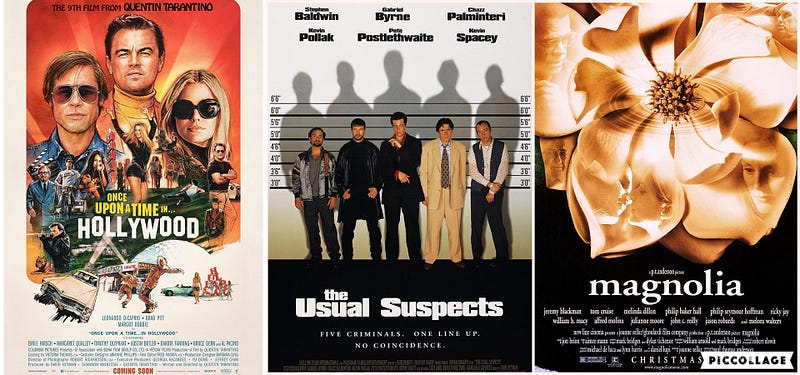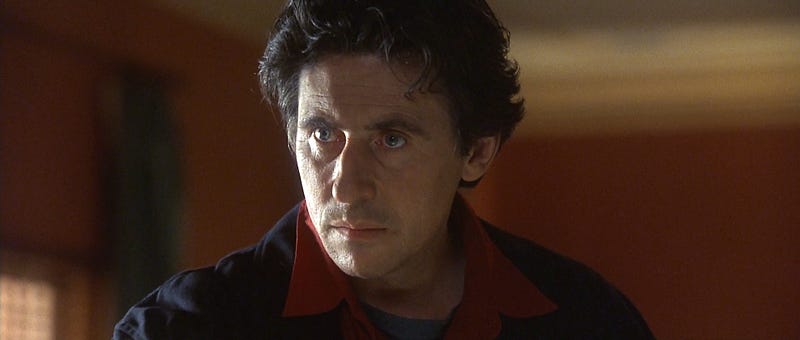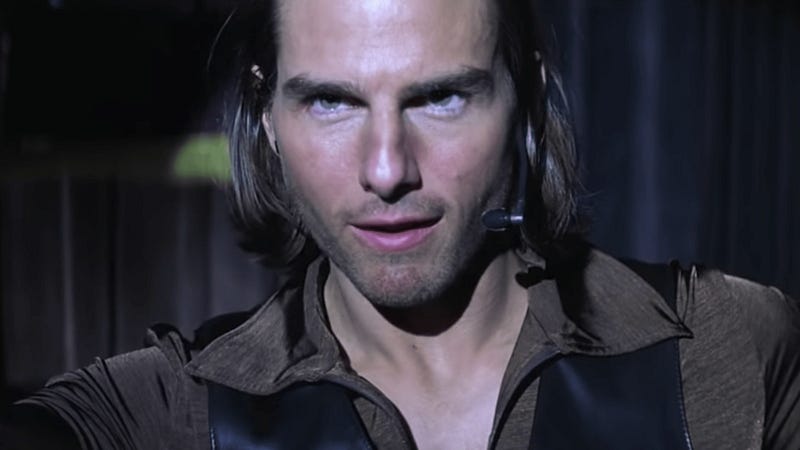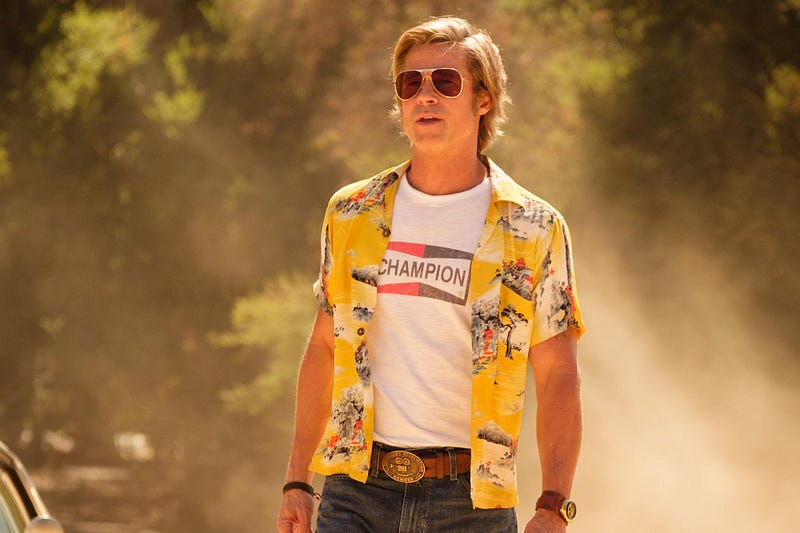With Gabriel, Tom and Brad.

With a dearth of quality new releases in these early months of 2023 (although I heartily recommend Darren Aronofsky’s The Whale, the Sam Mendes directed Empire of Light and my birthday trip to the cinema to see M Night Shyamalan’s Knock at the Cabin), I went old school last weekend and from an early Saturday evening into a smile filled early Sunday morning, I turned out the lights, disconnected from any possible distractions, and went to the movies with Gabriel, Tom and Brad, as well as a whole host of their friends and indeed enemies.
Having already written at length on two of our triple bill of cinematic delights I won’t be doing so again, rather a spoiler free ramble through these magnificent films via the written character creations of Christopher McQuarrie, Paul Thomas Anderson and Quentin Tarantino, and how our friends Gabriel, Tom and Brad imbued these character creations with such life in three films for the cinematic ages.
The Usual Suspects (1995)
A businessman, a “fence” or fixer, a hot head, a calmer head and a hustler are your titular, if unusual suspects ahead of a violent and bloody shoot-out for the destiny of a life changing sum of money for a hundred lifetimes. But are they a gang or even for that matter friends, and who is “Mr Kobayashi”, where is “Keyser Soze” and isn’t this all the work of the devil?
This double Oscar winner directed by Bryan Singer is currently 40th in the www.imdb.com top 250 movies of all time, a place behind the Martin Scorsese directed The Departed and a place ahead of Christopher Nolan’s The Prestige.
That, is some illustrious company indeed.

“Keaton” (Gabriel Byrne) Although Gabriel will forever be “Tom Reagan” in the 1990 Coen Brothers masterpiece Miller’s Crossing, here he’s the ultimate insider looking for a permanent way out, or the outsider with that way out but, akin to Al Pacino in the weakest of The Godfather trilogy, just when he thinks he’s out, “they pull me back in again!”. Back in with a cast of criminals he must depend upon and trust with his life, the life of a respectable businessman with a side line in criminality that ensures he must be wary of the heat around every corner and like Robert De Niro in the Michael Mann classic released in the same cinematic year of 1995 as The Usual Suspects, he has one final job, one final itch to scratch, before he’s out for good and into the waiting arms of the love of his life.
Keaton is a deliberately shadowy figure, cloaked in the respectability of a wealthy businessman and the haunted shadow of a figure of a man broken by the coming reality of his life brilliantly realised by director Bryan Singer toward the denouement of the film and his movement in one single camera motion of Keaton from the man in the shadows to the desperate man in the glare and deceit of daylight. Is he the devil now on full display, the mastermind behind the bloody and brutal carnage of death to be carried out in his name?
Or duped by the devil along with the rest of his gang of enemies?
Gabriel Byrne is masterful here, alongside Kevin’s Spacey and Pollack, Stephen Baldwin, Chazz Palminteri, the acting genius that was Pete Postlethwaite, as well as a young Giancarlo Esposito and a brilliantly, beautifully befuddling performance from a youthful Benicio Del Toro.
“The greatest trick the devil ever pulled was convincing the world he did not exist”.
Magnolia (1999)
Chance. Fate. Luck. Coincidence. Life choices. Depression. Societal anxiety. Lying. Cheating. Stealing. Death. Life. Loss. Kindness. Love. Adoration. Selflessness. Ambition. Dreams. Nightmares. Abuse. Redemption. And back to coincidence, luck, fate and chance in the circle of the lives realised by William H Macy, Melora Walters, John C Reilly, Jason Robards, Philip Seymour Hoffman, Melinda Dillon, Alfred Molina, Philip Baker Hall, Jeremy Blackman and Tom Cruise, as Aimee Mann implores us all to “Wise Up” before the raining frogs descend from the night sky.
My tired old joke is that I watch this film once a month in order just to “keep my hand in” and to make sure nothing has changed in a masterpiece of a film that will utterly destroy and depress the very arse off you. But then Claudia looks you straight in the eye with the brightest of smiles, and you dissolve into tears.
Nominated for three Oscars at the 2000 Academy Awards, Magnolia remains Paul Thomas Anderson’s grandest and most magnificent of creations, even though he would follow this soon after with Punch Drunk Love and There Will Be Blood in the first decade of a new century, before The Master, Inherent Vice, Phantom Thread and Licorice Pizza in the second.
Magnificent films all.
But Magnolia stands alone.

“Frank TJ Mackey” (Tom Cruise) Following the film’s cryptic opening on the coincidences and chances of life in a small world, Frank TJ Mackey is a constant presence throughout the now opening introductions to the lives of a buffoonish police officer with a heart of gold, a drug addicted abuse survivor heading for oblivion, a kindly nurse, two dying men, a kid of the past as well as a kid of an ugly looking future and a grifter saddled with suicidal guilt for the deceit of a beautifully foul mouthed dying man who may or may not be the father to a son he neglected when he was most in need. These narratives twist and interweave with each other immediately, the soundtrack to which is an advertisement or infomercial for Frank TJ Mackey and his “Seduce and Destroy” technique of reprehensible misogyny.
Call “1–877-TAME-HER”
All major credit cards accepted.
Frank TJ Mackey (and Cruise) now disappear until their joint creation makes a very singular entrance on 25 minutes amid macho, chest beating bravado and repugnant tips on seducing women and presentations on “How to fake like you are nice and caring”. Hair tied back, slim and trim in a leather waistcoat corset, Frank holds court to a seminar of fifty or so men hanging on his every utterance before, like every other character in this over three hour melancholic marathon, he now flits in and out of a story he’s as central to as they are. 45 seconds to a minute in duration, the short scenes sometimes a little longer, Frank becomes a naked “Batman” and “Superman” for a bemused reporter who’s about to slowly unpick the lies he tells himself let alone his adoring public. Now repeatedly shown in extreme close up as his mask slips, Cruise magnificently portrays the betrayal of his own lies as he silently judges his accuser before his unravelling is complete as first he berates a dying man before imploring him “Don’t go away, you fucking asshole, don’t go away. Don’t go away, you fucking asshole, don’t go away! Don’t go away you fucking asshole!” as he, and maybe you too, dissolve into yet more tears for an incredible film and performance from Tom Cruise he’s rarely bettered in a highly decorated and distinguished career.
“My name is Donnie Smith, and I have lots of love to give”.
Once Upon a Time in Hollywood (2019)
Quentin Tarantino re-writes history once more and yet again the Nazi’s are defeated on screen but this time, quite brilliantly, there’s the happiest of all endings. A love story to Hollywood and a re-writing of a part of its ugly history this may be, but it’s also a platonic love story between two men and an actor on the downturn of a career the stand-in stuntman needs for him to also be successful. But like Tarantino’s stuntman in his 2007 film Death Proof, Cliff Booth has an unspoken of history he escapes from by living in the moment of the glorious late 1960’s of a Hollywood he lives quietly on the outside of.
Eight Oscar nominations and two wins at the 2020 Academy Awards, Brad Pitt had gone from the stoner “Floyd” in the Tarantino written True Romance three decades past to laid back stuntman, and now Oscar winner.

“Cliff Booth” (Brad Pitt) In the four screen outings post picking up that golden acting statuette, Brad Pitt would singularly headline the intriguing Ad Astra (which I enjoyed at the cinema but have never re-watched) before 2022 saw the highs and lows of The Lost City (dreadful), Bullet Train (magnificent fun) and Babylon (must watch BUT still horribly dreadful). Se7en and Fight Club seemed like distant and faraway career highlights, but along came Quentin Tarantino and whilst his turn in Inglorious Basterds is beautifully absurd, he’s Robert Redford here as he outshines his co-star and Tarantino and Hollywood’s leading man, Leonardo DiCaprio.
Pitt is the film’s sunshine in a film Tarantino couldn’t or wouldn’t have made two decades ago. His character’s hinted at sinister backstory is brilliantly illuminated in the longer form book that accompanies the film and which I cannot recommend highly enough, but here on screen he is the smile of the sunshine of California and Hollywood and a career he was resigned to losing a long time ago and is rather enjoying whatever comes his way. Although in a supporting role, he has a film within a film all to himself of tussles with Bruce Lee and Charles Manson (a deleted scene from the released film) as well as a trip back in time and a house of horrors as Tarantino continues to masterfully direct the sunshine around him as his love letter to Hollywood takes a horrific turn.
“You’re a good friend Cliff” his lifelong friend announces, to which Cliff responds with a simple and still smiling “I try!” before Tarantino the director applies the magic dust of a beautiful ending his masterpiece so richly deserved.
“You know, you’re kinda pretty for a stuntman”.
Thanks for reading. Just for larks as always, and always a human reaction rather than spoilers galore. My three most recently published film articles are linked below or there’s well over 250 blog articles (with 500+ individual film reviews) within my film library from which to choose:
“Mother!” (2017)
Darren Aronofsky and a descent into hell.medium.com
“Women Talking” (2022)
“In that gaping silence was the real horror”.medium.com
“A Man Called Otto” (2022)
Underwhelming “As Good As It Gets” for the 21st Century.medium.com



